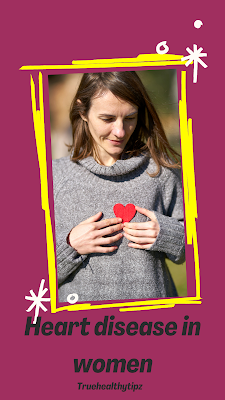Heart Disease in Women – Understanding Symptoms and Risk Management Tips

Cardiovascular disease is often considered to be a male-centric disease. However, the American Heart Association estimates that heart disease in women is the principal killer in those above twenty-five years of age. In the U.S., it is believed to kill almost twofold as many females as compared to all cancer forms inclusive of breast cancer. Merely thirteen percent of females consider heart disease to be a risk to their health.
Since protracted periods of time, heart disease researches have laid focus chiefly on men which is partly the reason for the disingenuous idea that heart disease is not a genuine issue for females.
Heart Disease in Women – Spotting Early Signs
Several research findings have indicated that women might have unidentified caveat signs for several days, months or years prior to experiencing heart attack.
The most crucial sign is a sense of tiredness despite adequate sleep. Other signs of heart disease in women are:
Respiratory difficulty.
Sleeping difficulty.
A sense of abdominal sickness.
Nervousness or feeling petrified.
Newly surfaced or aggravated headaches.
Chest pain.
Sense of heaviness or tightness felt in the chest.
Burning sensation in the chest.
Pains felt in back, in-between shoulder blades.
Pains or tense feeling in the chest which appears to radiate to the jaws, shoulder, neck, ear or the inner portion of the arm.
Stomach ache felt in the region over the navel.
Preventative Advice for Women
Less blood levels of HDL (high density cholesterol) or the good cholesterol are a strong forecaster of cardiovascular fatality among females as compared to males, according to the American Heart Association.
Estrogen might augment the likelihood of cardiovascular disease among elderly women. But, it might yet be shielding to some extent in averting heart disease when administered in some scenarios. Estrogen is possibly the best bet for females below sixty years old.
Present parameters back the usage of HRT for treating hot flashes. Definite guidelines are:
HRT might be given to females that have just lately become menopausal.
HRT must not be recommended for women that are menopausal since several years.
Use of the medication must be cross more than five to seven years.
Females who take HRT should have lesser chances of developing cardiovascular disease, stroke, blood clot formation or breast cancer.
According to guidelines furnished by the American Heart Association for preventing heart disease in women, the below mentioned lifestyle modifications are necessary.
No smoking or using tobacco.
Getting plentiful exercise. Females who need to shed excess pounds or maintain their weight must ideally be getting a minimal of an hour to ninety minutes of moderate level exercise on majority of the days. For weight maintenance, getting a minimal of thirty minutes of exercises per day, if possible for a minimum of five days per week.
Females that have lately experienced a heart attack or undergone angioplasty or angina or a stent implant procedure must ideally enrol in a heart rehab program.
Eating a heart-healthy dietetic intake that comprises of veggies, fruits, grains, less fat or fat-free milk produce, fishes, legume and protein source less in saturated fats.
Maintaining a healthful weight and striving for a BMI (body mass index) lying in-between 18.5 to 24.9 and waistline below thirty-five inches.
Undergoing check-ups and therapy in case needed for tackling depression.
Women at elevated risk must ideally be taking omega-3 fatty acids supplement.
Keeping blood pressure below 120 by 80 mmHg. In case blood pressure is over 140 by 90 mmHg then medications for lowering it must be taken. Diabetic individuals might require drugs at lesser levels.
New-fangled guidelines do not advice antioxidant supplement intake or folic acid for preventing cardiovascular disease among females.
Aspirin (dosage 75-325 milligram/day) or a medication known as clopidogrel might be advised in case of females at elevated risk of developing cardiovascular disease. For women above sixty-five years of age, aspiring is recommended for preventing heart attack and stroke till the time blood pressure is under control and the advantages are possibly outweighing the chances of developing gastro-intestinal side-effects. Regularly using aspirin is not advised for females in good health who are below sixty-five years of age for preventing heart attacks.






No comments:
Post a Comment